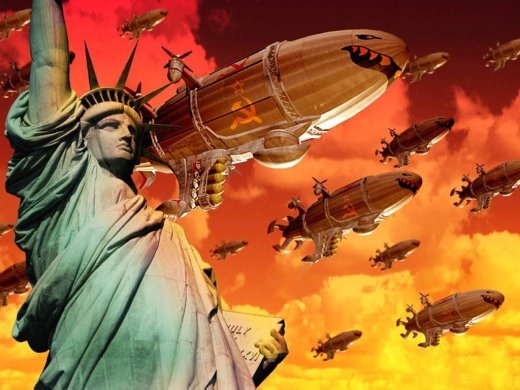
ABC NEWS: When Gibson said if under the NATO treaty, the United States would have to go to war if Russia again invaded Georgia, Palin responded: “Perhaps so. I mean, that is the agreement when you are a NATO ally, is if another country is attacked, you’re going to be expected to be called upon and help. “And we’ve got to keep an eye on Russia. For Russia to have exerted such pressure in terms of invading a smaller democratic country, unprovoked, is unacceptable,” she told Gibson. MORE
OBVIOUS FOLLOW-UP QUESTION THAT WAS NEVER ASKED: Governor, you are aware that Georgia is not a member of NATO, right?
OBVIOUS FOLLOW-UP QUESTION THAT WAS NEVER ASKED 2: You are aware that Russia has, like, A LOT of nuclear weapons, enough to wipe the United States off the map in a half an hour, and that’s why we never had a hot war them, or even talk glibly about the prospect of a war with Russia because that would be MADNESS. Governor, you are familiar with the concept of M.A.D. — mutual assured destruction?
OBVIOUS FOLLOW-UP QUESTION THAT WAS NEVER ASKED 3: How do you respond to the argument that by pushing for Georgia to be in NATO, by pushing for Ukraine to be in NATO, by putting a missile defense system in Czechoslovakia, this was seen as belligerent and aggressive by Putin and kind of brought him in? [SOURCE: GEORGE STEPHANOPOULOS]
TIMES OF LONDON: Russia’s president-elect adopted a hard line today over the prospect of Nato membership for neighbouring Georgia and Ukraine. Dmitri Medvedev said that expansion of the Western military alliance to include the two former Soviet republics would be “extremely troublesome” for European security. Nato members are due to meet in Bucharest, Romania, on April 2-4 to consider whether to offer Membership Action Plans to Georgia and Ukraine. President Bush has said that he supports Georgia’s desire for membership, and the US leader is also due to visit Ukraine next week on the eve of the Nato summit. “We are not happy about the situation around Georgia and Ukraine,” Mr Medvedev said. “We consider that it is extremely troublesome for the existing structure of European security… No state can be pleased about having representatives of a military bloc to which it does not belong coming close to its borders.”[MARCH 25th, 2008]
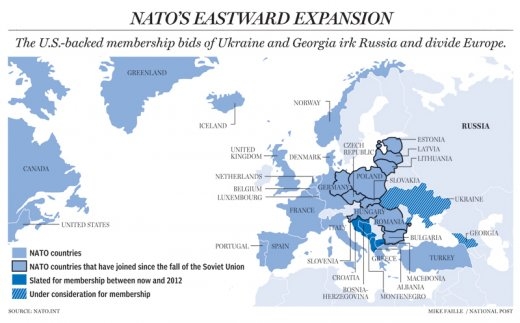
CATO INSTITUTE: NATO boosters ought to close the door of expansion, take a deep breath, and explain what, exactly, NATO’s mission is now. Equally important, they need to justify how it is in America’s self-interest for the alliance to acquire an ever-expanding roster of fragile and unpredictable client states on Russia’s border.
At the end of the Cold War, NATO’s purpose vanished. There was no longer a danger of Russian aggression against the West. Instead of disbanding, however, NATO took up an array of missions entirely unrelated to its original purpose — without bothering to define its new role. Relations between the alliance and Moscow are increasingly testy. NATO antagonized Russia in the late 1990s by circumventing the UN Security Council in attacking Russian ally Serbia. Now the alliance continues to poke at Russia by swallowing up former members of the Soviet bloc as fast as it can.
Advocates of continued NATO expansion express inexplicable surprise when Russia protests. By taking in the Baltic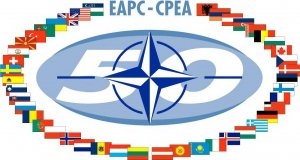 republics as members, NATO is already deeply involved in countries that have historically been well within Russia’s sphere of influence. The alliance seems poised to intrude further, and the Russian bear is beginning to growl. Nikolai Bordyuzha, spokesman for the Moscow-led Collective Security Treaty Organization, has made Russia’s views plain enough, warning that NATO bases surrounding Russia would constitute “a potential threat to Russia’s security.”
republics as members, NATO is already deeply involved in countries that have historically been well within Russia’s sphere of influence. The alliance seems poised to intrude further, and the Russian bear is beginning to growl. Nikolai Bordyuzha, spokesman for the Moscow-led Collective Security Treaty Organization, has made Russia’s views plain enough, warning that NATO bases surrounding Russia would constitute “a potential threat to Russia’s security.”
Russia — like any other country — tends to get alarmed when the world’s sole superpower extends security guarantees and military cooperation to countries on its borders. As NATO continues to expand, the United States has been hailing, and in some cases directly supporting, “color revolutions” that have caused instability and chaos in Ukraine, Georgia, and Kyrgyzstan. This is a dangerous mix from Moscow’s perspective.
It is also a dangerous mix from America’s standpoint. NATO is much more than a political club. It is a military alliance with serious obligations for the United States. Article 5 of the North Atlantic Treaty proclaims that an attack on one member is an attack on all. That means the United States is obligated to defend every member no matter how small, how militarily and economically insignificant, or how strategically exposed that member may be. MORE
 WIKIPEDIA: The Cato Institute is non-partisan, and its scholars’ views are not consistently aligned with either major political party. For example, Cato scholars have been sharply critical of the Bush administration on a wide variety of issues, including the Iraq war, civil liberties, education, health care, agriculture, energy policy, and excessive government spending. However, on other issues, most notably Social Security,[2][3] global warming,[4][5] tax policy,[6] and immigration,[7][8][9][10][11] Cato scholars have praised administration initiatives. Cato scholars have criticized both John McCain [12] [13] and Barack Obama. [14][15] MORE
WIKIPEDIA: The Cato Institute is non-partisan, and its scholars’ views are not consistently aligned with either major political party. For example, Cato scholars have been sharply critical of the Bush administration on a wide variety of issues, including the Iraq war, civil liberties, education, health care, agriculture, energy policy, and excessive government spending. However, on other issues, most notably Social Security,[2][3] global warming,[4][5] tax policy,[6] and immigration,[7][8][9][10][11] Cato scholars have praised administration initiatives. Cato scholars have criticized both John McCain [12] [13] and Barack Obama. [14][15] MORE
MEANWHILE: CARACAS, Venezuela — President Hugo Chavez ordered the U.S. ambassador to leave 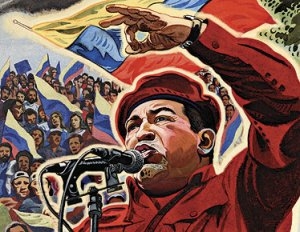 Venezuela in 72 hours and said he was immediately withdrawing his ambassador from Washington. Chavez said Thursday night that U.S. Ambassador Patrick Duddy is no longer welcome, just as his close ally Bolivia expelled the American envoy from La Paz a day earlier. “They’re trying to do here what they were doing in Bolivia,” Chavez said, accusing Washington of trying to oust him. “That’s enough … from you, Yankees,” he said during a televised rally, using an expletive. The socialist leader said Venezuela’s ambassador to Washington, Bernardo Alvarez, would return to the U.S. “when there’s a new government in the United States.” MORE
Venezuela in 72 hours and said he was immediately withdrawing his ambassador from Washington. Chavez said Thursday night that U.S. Ambassador Patrick Duddy is no longer welcome, just as his close ally Bolivia expelled the American envoy from La Paz a day earlier. “They’re trying to do here what they were doing in Bolivia,” Chavez said, accusing Washington of trying to oust him. “That’s enough … from you, Yankees,” he said during a televised rally, using an expletive. The socialist leader said Venezuela’s ambassador to Washington, Bernardo Alvarez, would return to the U.S. “when there’s a new government in the United States.” MORE
PLUS THIS: SANTA CRUZ, Bolivia (Reuters) – At least eight people were killed as violent anti-government protests flared in Bolivia on Thursday, creating havoc in the natural gas industry and raising tensions with the United States. Opposition activists shot dead seven peasant farmers in the remote Amazon region of Pando, a government official said, describing the incident as a massacre. An employee of the opposition-led regional government was also killed.
President Evo Morales’ leftist government blames the unrest on rightist governors who control four of the poor country’s nine regions. The opposition demands greater autonomy and energy revenue and opposes plans by Morales, a former coca farmer and Bolivia’s first indigenous president, to rewrite the constitution and distribute land to the poor.
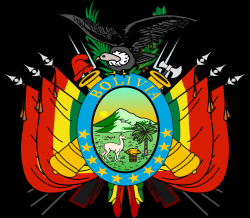 Washington ordered out the Bolivian ambassador on Thursday a day after Morales, a close ally of Venezuela’s fiery leftist leader Hugo Chavez, expelled U.S. Ambassador Philip Goldberg. Morales accused Goldberg of fanning the protests. State Department spokesman Sean McCormack said in a statement that Washington “officially informed the government of Bolivia of our decision to declare Ambassador Gustavo Guzman persona non grata.”
Washington ordered out the Bolivian ambassador on Thursday a day after Morales, a close ally of Venezuela’s fiery leftist leader Hugo Chavez, expelled U.S. Ambassador Philip Goldberg. Morales accused Goldberg of fanning the protests. State Department spokesman Sean McCormack said in a statement that Washington “officially informed the government of Bolivia of our decision to declare Ambassador Gustavo Guzman persona non grata.”
Chavez said he was expelling the U.S. ambassador from his oil-rich country in a show of support for Morales. “The yankee ambassador in Caracas has got 72 hours to get out of Venezuela, in solidarity with Bolivia,” he shouted at a political rally. He vowed earlier to come to the Bolivian president’s aid if there was a coup. In a sign of regional concern about the escalating chaos, Brazil’s more moderate leftist government said it would not accept any attempt to overthrow Morales. MORE
AND THIS: Militants killed two U.S. troops in eastern Afghanistan on the anniversary of 9/11, making 2008 the deadliest year for U.S. forces in the country that sheltered al-Qaida while it plotted the terror attacks on America. Few details were released about Thursday’s deaths. One soldier was killed when insurgents attacked a compound and the other in combat. Their deaths bring to 113 the number of troops who have died in Afghanistan, surpassing last year’s record toll of 111, according to a tally kept by The Associated Press. MORE
ROGER EBERT: And how can a politician her age have never have gone to Europe? My dad had died, my mom  was working as a book-keeper and I had a job at the local newspaper when, at 19, I scraped together $240 for a charter flight to Europe. I had Arthur Frommer’s $5 a Day under my arm, started in London, even rented a Vespa and drove in the traffic of Rome. A few years later, I was able to send my mom, along with the $15 a Day book.
was working as a book-keeper and I had a job at the local newspaper when, at 19, I scraped together $240 for a charter flight to Europe. I had Arthur Frommer’s $5 a Day under my arm, started in London, even rented a Vespa and drove in the traffic of Rome. A few years later, I was able to send my mom, along with the $15 a Day book.
You don’t need to be a pointy-headed elitist to travel abroad. You need curiosity and a hunger to see the world. What kind of a person (who has the money) arrives at the age of 44 and has only been out of the country once, on an official tour to Iraq? Sarah Palin’s travel record is that of a provincial, not someone who is equipped to deal with global issues.
But some people like that. She’s never traveled to Europe, Asia, Africa, South America or Down Under? That makes her like them. She didn’t go to Harvard? Good for her! There a lot of hockey moms who haven’t seen London, but most of them would probably love to, if they had the dough. And they’d be proud if one of their kids won a scholarship to Harvard.
I trust the American people will see through Palin, and save the Republic in November. The most damning indictment against her is that she considered herself a good choice to be a heartbeat away. That shows bad judgment. MORE
